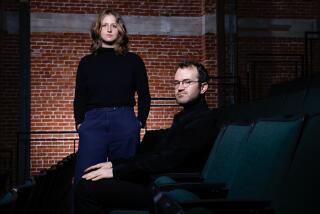Vaudeville--on Film
- Share via
If you like classic comedy movies, the Vaudeville Film Festival at the Skirball Cultural Center is definitely for you.
The event, which runs through Feb. 22 at the center, highlights the careers of Jewish performers in early sound films.
Many of the movies were difficult to get, say festival organizers, despite the Skirball’s proximity to practically every major Hollywood studio.
But because the films are from the 1920s and ‘30s, tracking them down was a lengthy process that required lots of detective work.
“It was a nightmare,” said Jordan Peimer, assistant program director of the Skirball Cultural Center. “Some came from private collectors in Ohio, St. Louis and all over California. It took me about five months to get them all.”
They’re well worth the effort. Many of them are among the first sound films created, and most are not played in theaters or television with any regularity.
The festival will include five full-length films and nine shorts at the Skirball Center’s 350-seat auditorium, which is also used for lectures, concerts, readings and performances. The center is off the San Diego Freeway in the Sepulveda Pass.
Among the films is the Marx Brothers’ 1929 movie “The Cocoanuts,” based on the George Kaufman and Irving Berlin play about the Florida land boom and a plot to steal jewelry.
The Eddie Cantor double bill includes “Glorifying the American Girl” from 1929, and “Whoopee!,” a 1930 movie that includes a singing cameo by Betty Grable.
“An Afternoon With George and Gracie” will feature “Six of a Kind,” a 1934 flick in which George Burns and Gracie Allen go on vacation and run aground of policeman W.C. Fields.
Three Burns and Allen shorts will also be shown the same day: “Fit to Be Tied” and “The Antique Shop” from 1930, and “Walking the Baby” from 1932.
Some of the other shorts include “Between Acts at the Opera,” starring Will and Eugene Howard; “Popping the Cork,” starring Milton Berle; and “A Taxi Tangle,” with Jack Benny.
The festival earned its name because there are lots of references to vaudeville in all the films.
A primary source of amusement in the early half of the 20th century, before radio, movies and television, vaudeville encompassed music, dance, theater and comedy along with whistlers, plate-spinners and contortionists.
“It was such an important influence in early television,” Peimer said. “But it’s been lost in the last 20 years because people are focusing on modern, contemporary themes.”
Peimer, who created and organized the festival, said the idea came to him when he was at a conference in New York. While visiting the Museum of Modern Art’s library, he picked up a book called “What Made Pistachio Nuts” and was surprised by what he read.
“I loved the title, so I started reading and I was impressed with the fact that there was a strong tradition of Jews in early sound comedy,” Peimer said. “I really wanted to do a film series based on the idea of surreal, anarchistic comedies anyway.”
So Peimer got busy, making phone calls and writing letters to, among others, Henry Jenkins, the author of “What Made Pistachio Nuts,” who was instrumental in helping Peimer find some of the films.
“It was really anxiety-producing because even once I tracked down the films, there was the question of what their quality would be like,” Peimer said. “It turns out that some of them were in terrible condition.”
And because many of these movies can rarely be viewed elsewhere, organizers of the Vaudeville Film Festival expect a great turnout. Already, advanced ticket sales have surpassed any other film festival held at the Skirball, Peimer says.
“Maybe on a rainy Sunday, when a baseball game is rained out, KTLA will play an Eddie Cantor movie,” Peimer said. “But nowhere else can you view all of these classics together.”
BE THERE
The Vaudeville Film Festival, Thursdays and Sundays through Feb. 22 at the Skirball Cultural Center, 2701 N. Sepulveda Blvd. Classic movies star such famous Jewish performers as the Marx Brothers, Eddie Cantor and Jack Benny. Admission is $6, $4 for students. For film times, call (310) 440-4500. To purchase tickets, call (213) 660-8587.
More to Read
Only good movies
Get the Indie Focus newsletter, Mark Olsen's weekly guide to the world of cinema.
You may occasionally receive promotional content from the Los Angeles Times.










